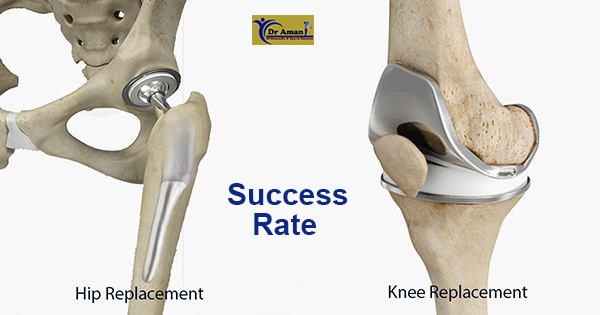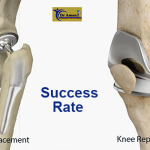Understanding the Longevity of Hip and Knee Replacement: Insights and Considerations
In the realm of orthopedic surgery, hip and knee replacements stand out as transformative procedures, offering respite from chronic pain and restoring mobility for countless individuals suffering from severe arthritis. However, the decision to undergo joint replacement surgery is not one to be taken lightly. Patients often wonder: How long will my hip or knee replacement last? This article delves into the intricacies of joint replacement longevity, exploring factors influencing durability, recent research findings, and key considerations for patients and surgeons alike.
Factors Influencing Joint Replacement Longevity
Hip and knee replacements have traditionally been lauded for their ability to provide relief lasting up to 10 to 15 years or more in the majority of cases. However, the durability of these replacements hinges on a multitude of factors, including:
Surgical Technique and Surgeon Experience:
The skill and experience of the operating surgeon play a pivotal role in the success of joint replacement surgeries. Advanced techniques, meticulous surgical approaches, and surgeon expertise contribute to favorable outcomes and extended implant longevity.
Patient Factors:
Age, weight, activity level, and overall health status significantly impact the lifespan of hip and knee replacements. Younger, more active patients may place greater demands on their artificial joints, potentially accelerating wear and necessitating earlier revision surgeries.
Implant Materials and Design:
Technological advancements have revolutionized the materials and design of hip and knee implants. Innovative biomaterials, such as titanium alloys and high-density polyethylene, offer enhanced durability and biocompatibility, contributing to prolonged implant lifespan.
Preoperative Preparation and Rehabilitation:
Comprehensive preoperative assessment, including targeted exercise regimens and weight management strategies, can optimize patient outcomes and foster successful joint replacements. Postoperative rehabilitation plays a crucial role in restoring function and minimizing complications, thereby promoting long-term joint health.
Insights from Recent Studies
Recent research endeavors have shed light on the longevity of hip and knee replacements, yielding valuable insights into revision rates and patient outcomes. A seminal study published in The Lancet underscored the following key findings:
- Among over 60,000 individuals undergoing hip replacement surgery, the 10-year revision rate stood at 4.4%, escalating to 15% by the 20-year mark.
- Similarly, among nearly 55,000 patients undergoing knee replacement, the 10-year revision rate was 3.9%, rising to 10.3% after 20 years.
- Age emerged as a significant determinant of revision risk, with younger patients facing higher rates of implant failure and subsequent revision surgeries.
Navigating Joint Replacements Decisions
In light of evolving research and clinical insights, patients and healthcare providers must navigate joint replacement decisions with prudence and foresight. While joint replacement surgery offers profound benefits, it also carries inherent risks and considerations:
Shared Decision-Making:
Engaging in informed discussions with healthcare providers empowers patients to make sound decisions aligned with their preferences, values, and treatment goals. Shared decision-making frameworks emphasize collaborative dialogue and patient-centered care, fostering trust and mutual understanding.
Risk Stratification and Patient Selection:
Risk stratification tools enable clinicians to assess patient-specific factors and prognosticate implant longevity. Tailored risk assessments facilitate individualized treatment plans and optimize patient outcomes across diverse demographic groups.
Lifestyle Modification and Risk Mitigation:
Adopting healthy lifestyle practices, including weight management, smoking cessation, and regular exercise, can mitigate surgical risks and enhance postoperative recovery. Patient education initiatives underscore the importance of proactive self-care and adherence to rehabilitation protocols.
Surveillance and Follow-Up:
Postoperative surveillance and long-term follow-up are integral components of joint replacement care. Regular monitoring of implant function, patient-reported outcomes, and radiographic findings enables early detection of complications and timely intervention when indicated.
Conclusion: Empowering Informed Decision-Making
In conclusion, the longevity of hip and knee replacements represents a multifaceted conundrum shaped by surgical expertise, patient factors, and technological innovations. While joint replacement surgery offers remarkable therapeutic benefits, it necessitates careful consideration of risks, benefits, and long-term implications. By fostering collaborative partnerships between patients and healthcare providers, we can navigate the complexities of joint replacement decisions and optimize patient outcomes in the pursuit of musculoskeletal health and well-being.
As patients embark on their joint replacement journeys, they are encouraged to seek comprehensive education, advocate for shared decision-making, and embrace a holistic approach to orthopedic care. Together, we can unravel the mysteries of joint replacement longevity and pave the way for enhanced quality of life and functional independence for generations to come.
This comprehensive article aims to provide actionable insights into the longevity of hip and knee replacements, empowering patients to make informed decisions and embark on their orthopedic journeys with confidence and clarity
Frequently Asked Questions (FAQs) About Hip and Knee Replacements
1. How long do hip and knee replacements typically last?
Hip and knee replacements are designed to provide long-term relief from pain and restore function. While individual outcomes may vary, most replacements are expected to last at least 10 to 15 years or more, with advancements in surgical techniques and implant materials contributing to improved durability.
2. What factors influence the longevity of hip and knee replacements?
The longevity of hip and knee replacements is influenced by various factors, including surgical technique, surgeon experience, patient age, weight, activity level, implant materials, and postoperative rehabilitation. By optimizing these factors, patients can enhance the lifespan of their joint replacements and minimize the need for revision surgery.
3. What is revision surgery, and when might it be necessary?
Revision surgery involves replacing a previously implanted joint replacement with a new prosthesis. It may be necessary due to factors such as implant loosening, infection, wear and tear, or suboptimal outcomes from the initial surgery. Revision surgeries are typically more complex and carry higher risks than primary joint replacements.
4. How can patients prolong the lifespan of their hip and knee replacements?
Patients can take proactive steps to prolong the lifespan of their hip and knee replacements by maintaining a healthy lifestyle, adhering to postoperative rehabilitation protocols, avoiding excessive strain on the replaced joint, and attending regular follow-up appointments with their healthcare providers. Engaging in regular physical activity and weight management can also contribute to joint health and longevity.
5. What are the signs that a hip or knee replacement may need to be replaced?
Signs that a hip or knee replacement may need to be replaced include persistent pain, swelling, stiffness, instability, reduced range of motion, and difficulty performing daily activities. If patients experience any of these symptoms, they should promptly consult with their orthopedic surgeon for evaluation and management.
6. Are there alternative treatments to hip and knee replacement surgery?
Depending on the severity of joint damage and individual patient factors, alternative treatments to hip and knee replacement surgery may include medication, physical therapy, corticosteroid injections, viscosupplementation, and lifestyle modifications. However, in cases of advanced arthritis and debilitating symptoms, joint replacement surgery may offer the most effective and lasting solution.
7. How can patients prepare for hip and knee replacement surgery?
Patients can prepare for hip and knee replacement surgery by attending preoperative consultations, completing necessary medical evaluations, following preoperative instructions from their healthcare providers, arranging for postoperative care and rehabilitation, and addressing any concerns or questions they may have about the procedure.
8. What is the recovery process like after hip and knee replacement surgery?
The recovery process after hip and knee replacement surgery typically involves a combination of pain management, physical therapy, and gradual resumption of activities of daily living. Patients are advised to follow their surgeon’s recommendations regarding postoperative exercises, weight-bearing restrictions, and follow-up appointments to optimize recovery and functional outcomes.
9. Can hip and knee replacement be performed as outpatient procedures?
While some patients may qualify for outpatient hip and knee replacement surgery, most procedures require a short hospital stay to monitor postoperative recovery and manage any potential complications. The decision to perform outpatient surgery depends on factors such as patient health status, surgical complexity, and institutional protocols.
10. What should patients expect during follow-up appointments after hip and knee replacement surgery?
During follow-up appointments after hip and knee replacement surgery, patients can expect to undergo clinical evaluations, imaging studies, and assessments of joint function and mobility. Healthcare providers will monitor for signs of complications, address patient concerns, and provide guidance on long-term joint care and maintenance.
These frequently asked questions aim to address common queries and concerns related to hip and knee replacements, empowering patients with valuable information to make informed decisions about their orthopedic health and treatment options. For more information about hip and knee replacement surgery, you can visit Dr. Aman’s website. Dr. Aman is an orthopedic and sports surgeon based in Pakistan, providing expert care and treatment for orthopedic conditions.





